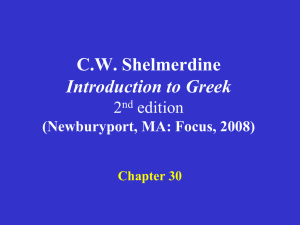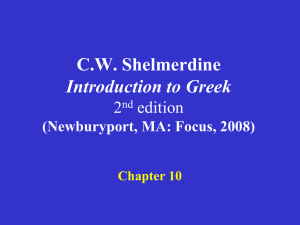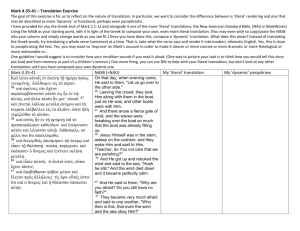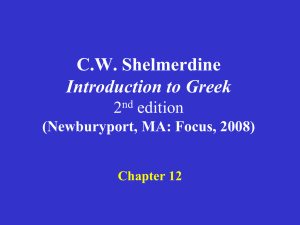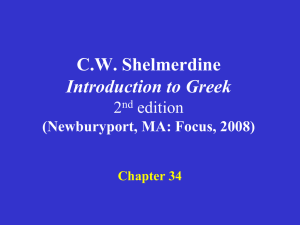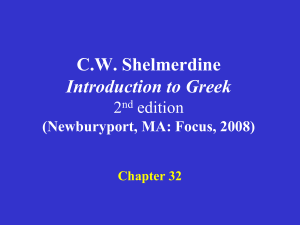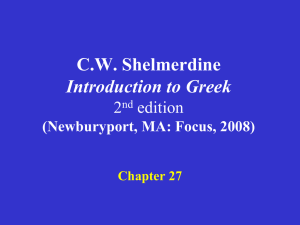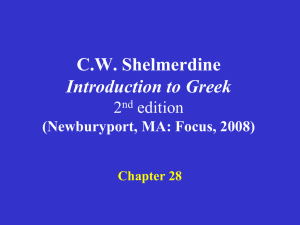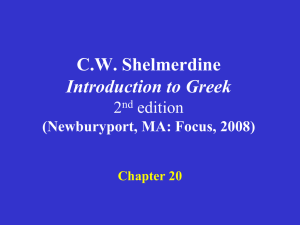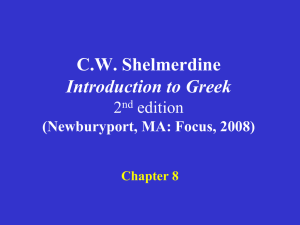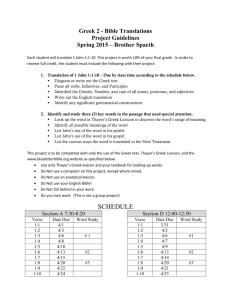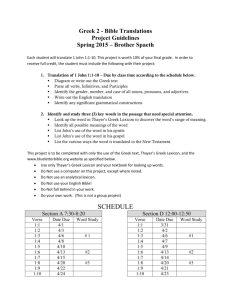Chapter 14
advertisement
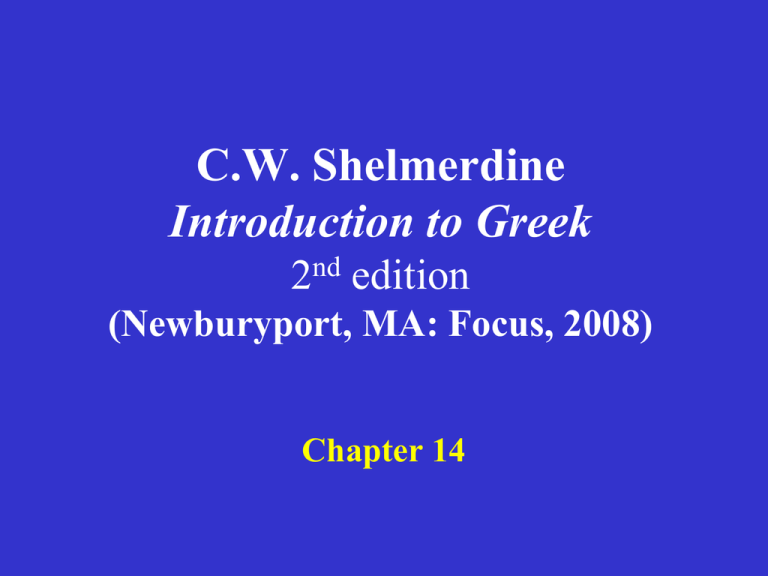
C.W. Shelmerdine Introduction to Greek 2nd edition (Newburyport, MA: Focus, 2008) Chapter 14 Shelmerdine Chapter 14 1. 2. 3. 4. 5. 3rd declension nouns: stems in –ι, –υ Principal parts of labial stem verbs νομίζω and φημί Indirect statement The infinitive in indirect statement Shelmerdine Chapter 14 1. 2. 3. 4. 5. 3rd declension nouns: stems in –ι, –υ Principal parts of labial stem verbs νομίζω and φημί Indirect statement The infinitive in indirect statement Shelmerdine Chapter 14 1. 3rd declension nouns: stems in –ι, –υ • • The last major group of 3rd declension nouns has stems ending in -ι or -υ. The -ι or -υ appears in only three forms: the nominative, accusative, and vocative singulars. – • The accusative singular uses the ending –ν (instead of -α). When the stem of a 3rd declension noun ends in -ι or -υ, in most forms the -ι or -υ becomes an -ε. – In the nominative, accusative and vocative plural, the resulting -εες contracts to -εις. (-εα -η for neuters). Shelmerdine Chapter 14 1. 3rd declension nouns: stems in –ι, –υ When the stem of a 3rd declension noun ends in -ι or -υ, in most forms the -ι or -υ becomes an -ε. – In the nominative, accusative and vocative plural, the resulting -εες contracts to -εις. (-εα -η for neuters). The genitive singular ends in –ως (rather than -ος). – Both the singular and plural of the genitive accent the antepenult, despite the long ultima. Shelmerdine Chapter 14 1. 3rd declension nouns: stems in –ι, –υ Thus the forms of πόλις, πόλεως ἡ “city” singular Nom. πόλις Gen. πόλεως Dat. πόλει Acc. πόλιν Voc. πόλι plural Nom. πόλεις Gen. πόλεων Dat. πόλεσι Acc. = nom. Voc. = nom. Shelmerdine Chapter 14 1. 3rd declension nouns: stems in –ι, –υ A very few nouns with stems in -υ follow an analogous pattern. Thus the forms of πρέσβυς, πρέσβεως ὁ “elder” singular Nom. πρέσβυς Gen. πρέσβεως Dat. πρέσβει Acc. πρέσβυν Voc. πρέσβυ plural Nom. πρέσβεις Gen. πρέσβεων Dat. πρέσβεσι Acc. = nom. Voc. = nom. Shelmerdine Chapter 14 1. 3rd declension nouns: stems in –ι, –υ A very few nouns with stems in –υ follow an analogous pattern. Thus the forms of ἄστυ, ἄστεως τό “town” singular Nom. ἄστυ Gen. ἄστεως Dat. ἄστει Acc. = nom. Voc. = nom. plural Nom. ἄστη Gen. ἄστεων Dat. ἄστεσι Acc. = nom. Voc. = nom. Shelmerdine Chapter 14 1. 3rd declension nouns: stems in –ι, –υ A very few nouns with stems in -υ retain the full stem. Thus the forms of ἰχθύς, ἰχθύος ὁ “fish” singular Nom. ἰχθύς Gen. ἰχθύος Dat. ἰχθύι Acc. ἰχθύν Voc. ἰχθύ plural Nom. ἰχθύες Gen. ἰχθύων Dat. ἰχθύσι Acc. ἰχθῦς (later ἰχθύας) Voc. = nom. Shelmerdine Chapter 14 1. 2. 3. 4. 5. 3rd declension nouns: stems in –ι, –υ Principal parts of labial stem verbs νομίζω and φημί Indirect statement The infinitive in indirect statement Shelmerdine Chapter 14 2. Principal parts of labial stem verbs • • Page 82 gives the first four principal parts for all the labial (π, β, φ) stem verbs so far in your vocabulary. Recall that a labial (π, β, φ) followed by a σ becomes ψ, so the future (2nd principal part) and aorist (3rd principal part) will normally display ψ. Shelmerdine Chapter 14 1. 2. 3. 4. 5. 3rd declension nouns: stems in –ι, –υ Principal parts of labial stem verbs νομίζω and φημί Indirect statement The infinitive in indirect statement Shelmerdine Chapter 14 3. νομίζω and φημί • • • • The verb φημί means “say.” Like εἰμί, it is a common verb of the –μι conjugation. The future φήσω and aorist ἔφησα are completely regular. οὐ + φημί means “deny” or “say <something> is not” – οὐ λέγω means “not say” Shelmerdine Chapter 14 • • • • • • *φημί φῄς *φησί(ν) *φαμέν *φατέ *φασί(ν) Present Tense * = enclitic forms • • • • • • ἔφην ἔφησθα/ἔφης ἔφη ἔφαμεν ἔφατε ἔφασαν Imperfect Tense infinitive φάναι Shelmerdine Chapter 14 3. νομίζω and φημί • • In Moodle is a pdf entitled “Verbs of Saying in Ancient Greek” which lays out the various verbs of saying and speaking in different tenses. These verbs (+ νομίζω) often set up indirect statement (see next section). Shelmerdine Chapter 14 1. 2. 3. 4. 5. 3rd declension nouns: stems in –ι, –υ Principal parts of labial stem verbs νομίζω and φημί Indirect statement The infinitive in indirect statement Shelmerdine Chapter 14 4. Indirect statement • A direct statement declares an action. – • A direct quote gives someone’s exact words. – • They are coming. I say, “They are coming.” An indirect statement reports someone’s words. – I say (that) they are coming. Shelmerdine Chapter 14 2. Indirect statement – – – • • I say, “They are coming.” I say (that) they are coming. I said (that) they were coming. Notice that English sometimes shifts the tense of a verb in indirect statement. Greek sometimes shifts mood, but rarely tense, in indirect statement. Shelmerdine Chapter 14 1. 2. 3. 4. 5. 3rd declension nouns: stems in –ι, –υ Principal parts of labial stem verbs νομίζω and φημί Indirect statement The infinitive in indirect statement Shelmerdine Chapter 14 5. The infinitive in indirect statement • Verbs which mean “say,” (e.g., φημί) “think” or “believe” (e.g., νομίζω) generally set up indirect statements with verbs in the infinitive. Shelmerdine Chapter 14 5. The infinitive in indirect statement • • The tense of the infinitive remains what it was in the original statement. οἱ στρατιῶται τάχιστα ἦλθον. – • The soldiers came very quickly. νομίζουσιν οἱ στρατιῶται τάχιστα ἐλθεῖν. – The soldiers believe they came very quickly. Shelmerdine Chapter 14 5. The infinitive in indirect statement • • The infinitive in one sense is the direct object of the verb. νομίζουσιν οἱ στρατιῶται τὴν τιμήν. – • The soldiers believe in honor. νομίζουσιν οἱ στρατιῶται τάχιστα ἐλθεῖν. – The soldiers believe they came very quickly. Shelmerdine Chapter 14 5. The infinitive in indirect statement • Consequently, if the infinitive in the indirect statement has a distinct subject, it appears in the accusative. • νομίζουσιν οἱ στρατιῶται τάχιστα ἐλθεῖν. – • The soldiers believe they (the soldiers) came very quickly. οἱ στρατιῶται νομίζουσι τοὺς πολεμίους τάχιστα ἐλθεῖν. – The soldiers believe the enemy came very quickly. Shelmerdine Chapter 14 5. The infinitive in indirect statement • Remember that English sometimes backshifts the tense in indirect statement, but Greek does not. • νομίζουσιν οἱ στρατιῶται τάχιστα ἔρχεσθαι. – • The soldiers believe they come very quickly. ἐνόμισαν οἱ στρατιῶται τάχιστα ἔρχεσθαι. – The soldiers believed they came very quickly. Shelmerdine Chapter 14 Xenophon of Athens Ξενοφῶν ὁ Ἀθηναῖος (c.430-c.355 BC) Shelmerdine Chapter 14 Ξενοφῶντος Κύρου Ἀνάβασις Sol Yurick The Warriors novel (1965) Walter Hill The Warriors (1979) Shelmerdine Chapter 14 μετὰ δὲ τὸν πόλεμον ὁ Ξενοφῶν ἤγαγε τοὺς Ἕλληνας διὰ τῆς Ἀρμενίας. ἧκον δ' εἰς χώραν καλήν, ἧς ὁ ἄρχων τοῖς Ἕλλησιν ἡγεμόνα ἔπεμψεν. καὶ ὁ ἡγεμὼν ἔφη πέντε ἡμερῶν ἄξειν τὸ στρατιὰν πρὸς ὅρος ὅθεν ἡ θάλαττα ἔσεσθαι φανερά. εἰ δὲ μή, ἐθέλειν ἔφη ἀποθανεῖν. οὐ μέντοι διὰ τὴν πρὸς τοὺς Ἕλληνας εὐνοίαν ἕνεκα ἦγεν αὐτοὺς· ἡ γὰρ ὁδὸς ἡ τῆς στρατιᾶς ἦν διὰ χώρας ἣ πολεμία ἦν τῷ ἄρχοντι. Shelmerdine Chapter 14 μετὰ δὲ τὸν πόλεμον ὁ Ξενοφῶν ἤγαγε τοὺς Ἕλληνας διὰ τῆς Ἀρμενίας. ἧκον δ' εἰς χώραν καλήν, ἧς ὁ ἄρχων τοῖς Ἕλλησιν ἡγεμόνα ἔπεμψεν. καὶ ὁ ἡγεμὼν ἔφη πέντε ἡμερῶν ἄξειν τὸ στρατιὰν πρὸς ὅρος ὅθεν ἡ θάλαττα ἔσεσθαι φανερά. εἰ δὲ μή, ἐθέλειν ἔφη ἀποθανεῖν. οὐ μέντοι διὰ τὴν πρὸς τοὺς Ἕλληνας εὐνοίαν ἦγεν αὐτοὺς· ἡ γὰρ ὁδὸς ἡ τῆς στρατιᾶς ἦν διὰ χώρας ἣ πολεμία ἦν τῷ ἄρχοντι. Shelmerdine Chapter 14 μετὰ δὲ τὸν πόλεμον ὁ Ξενοφῶν ἤγαγε τοὺς Ἕλληνας διὰ τῆς Ἀρμενίας. ἧκον δ' εἰς χώραν καλήν, ἧς ὁ ἄρχων τοῖς Ἕλλησιν ἡγεμόνα ἔπεμψεν. καὶ ὁ ἡγεμὼν ἔφη πέντε ἡμερῶν ἄξειν τὸ στρατιὰν πρὸς ὅρος ὅθεν ἡ θάλαττα ἔσεσθαι φανερά. εἰ δὲ μή, ἐθέλειν ἔφη ἀποθανεῖν. οὐ μέντοι διὰ τὴν πρὸς τοὺς Ἕλληνας εὐνοίαν ἦγεν αὐτοὺς· ἡ γὰρ ὁδὸς ἡ τῆς στρατιᾶς ἦν διὰ χώρας ἣ πολεμία ἦν τῷ ἄρχοντι. The March of the Ten Thousand Ἕλλας Ἀρμενία ἡ θάλαττα Shelmerdine Chapter 14 ἔπεισεν οὖν τοὺς Ἕλληνας αἴθειν καὶ φθείρειν τὴν χώραν. ὁ δὲ ἡγεμὼν τέλος ἤγαγεν αὐτοὺς εἰς τὸ ὄρος ὀνόματι ἦν Θήχης. τότε ἔσπευδον οἱ στρατιῶται, ἐπεὶ δὲ οἱ πρῶτοι ἦσαν ἐπὶ τοῦ ὄρους, ὁ Ξενοφῶν ἤκουσαν κραυγὴν. ἀναβαίνει δ' οὖν ἐφ' ἵππον καὶ ἀκούει τὴν βοήν, Θάλαττα θάλαττα. Shelmerdine Chapter 14 ἔπεισεν οὖν τοὺς Ἕλληνας αἴθειν καὶ φθείρειν τὴν χώραν. ὁ δὲ ἡγεμὼν τέλος ἤγαγεν αὐτοὺς εἰς τὸ ὄρος ὀνόματι ἦν Θήχης. τότε ἔσπευδον οἱ στρατιῶται, ἐπεὶ δὲ οἱ πρῶτοι ἦσαν ἐπὶ τοῦ ὄρους, ὁ Ξενοφῶν ἤκουσαν κραυγὴν. ἀναβαίνει δ' οὖν ἐφ' ἵππον καὶ ἀκούει τὴν βοήν, Θάλαττα θάλαττα. Shelmerdine Chapter 14 ἔπεισεν οὖν τοὺς Ἕλληνας αἴθειν καὶ φθείρειν τὴν χώραν. ὁ δὲ ἡγεμὼν τέλος ἤγαγεν αὐτοὺς εἰς τὸ ὄρος ὀνόματι ἦν Θήχης. τότε ἔσπευδον οἱ στρατιῶται, ἐπεὶ δὲ οἱ πρῶτοι ἦσαν ἐπὶ τοῦ ὄρους, ὁ Ξενοφῶν ἤκουσαν κραυγὴν. ἀναβαίνει δ' οὖν ἐφ' ἵππον καὶ ἀκούει τὴν βοήν, Θάλαττα θάλαττα. Shelmerdine Chapter 14 ἐπεὶ δὲ οἱ στρατιῶται ἧκον ἐπὶ τὸ ἄκρον, περιέβαλλον ἀλλήλους καὶ στρατηγοὺς καὶ λοχαγούς, καὶ ἐδάκρυον. καὶ οἱ στρατιῶται ἔφερον λίθους καὶ κολωνὸν παρεσκεύαζον. τῷ δὲ ἡγεμόνι παρέσχον δῶρα, ἵππον καὶ φιάλην ἀργύρου καὶ σκευὴν Περσικὴν καὶ δαρεικοὺς δέκα, καὶ αὐτὸν ἀπέπεμψαν. Shelmerdine Chapter 14 ἐπεὶ δὲ οἱ στρατιῶται ἧκον ἐπὶ τὸ ἄκρον, περιέβαλλον ἀλλήλους καὶ στρατηγοὺς καὶ λοχαγούς, καὶ ἐδάκρυον. καὶ οἱ στρατιῶται ἔφερον λίθους καὶ κολωνὸν παρεσκεύαζον. τῷ δὲ ἡγεμόνι παρέσχον δῶρα, ἵππον καὶ φιάλην ἀργύρου καὶ σκευὴν Περσικὴν καὶ δαρεικοὺς δέκα, καὶ αὐτὸν ἀπέπεμψαν. Shelmerdine Chapter 14 ἐπεὶ δὲ οἱ στρατιῶται ἧκον ἐπὶ τὸ ἄκρον, περιέβαλλον ἀλλήλους καὶ στρατηγοὺς καὶ λοχαγούς, καὶ ἐδάκρυον. καὶ οἱ στρατιῶται ἔφερον λίθους καὶ κολωνὸν παρεσκεύαζον. τῷ δὲ ἡγεμόνι παρέσχον δῶρα, ἵππον καὶ φιάλην ἀργύρου καὶ σκευὴν Περσικὴν καὶ δαρεικοὺς δέκα, καὶ αὐτὸν ἀπέπεμψαν. a cairn (κολωνός) φιάλη δαρεικός σκευὴ Περσική Shelmerdine Chapter 14 Ἰησοῦς Χριστὸς Θεοῦ υἱὸς σωτήρ. σωτήρ, σωτῆρος ὁ savior υἱός –οῦ ὁ son Shelmerdine Chapter 14 οἱ δὲ ἄλλοι μαθηταὶ τῷ πλοιαρίῳ ἦλθον, οὐ γὰρ ἦσαν μακρὰν ἀπὸ τῆς γῆς ἀλλὰ ὡς ἀπὸ πηχῶν διακοσίων, σύροντες τὸ δίκτυον τῶν ἰχθύων. ὡς οὖν ἀπέβασαν εἰς τὴν γῆν, βλέπουσιν ἀνθρακιὰν κειμένην καὶ ὀψάριον ἐπικείμενον καὶ ἄρτον. ἄλλος –η –ον other ἀνθρακιά -ᾶς ἡ charcoal ἀπέβασαν "they got out (of the boats)" ἄρτος –ου ὁ bread βλέπω see γῆ γῆς ἡ earth διακόσιος –αι –α two hundred δίκτυον –ου τό net ἐπικείμενον lying next to ἦλθον "they came" (aorist of ἔρχομαι) κειμενήν "lying there" μαθητής –οῦ ὁ disciple μακράν far ὀψάριον –ου τό fish πῆχυς –εως ὁ cubit (= 18 inches) πλοιάριον –ου τό boat σύροντες dragging ὡς about, when Shelmerdine Chapter 14 λέγει αὐτοῖς ὁ Ἰησοῦς, Ἐνέγκατε ἀπὸ τῶν ὀψαρίων ὧν ἐπιάσατε νῦν. ἀνέβη οὖν Σίμων Πέτρος καὶ εἵλκυσεν τὸ δίκτυον εἰς τὴν γῆν μεστὸν ἰχθύων μεγάλων ἑκατὸν πεντήκοντα τριῶν. ἀνέβη “(he) walked up” γῆ γῆς ἡ earth δίκτυον –ου τό net ἑκατόν hundred ἕλκω, ἑλκύσω, εἵλκυσα drag ἐνέγκατε = ἐνέγκετε (< φέρω) μέγας, μεγάλη, μέγαν big μεστός -ή -όν full ὀψάριον –ου τό fish πεντήκοντα fifty πιάζω catch τρεῖς τρία three
